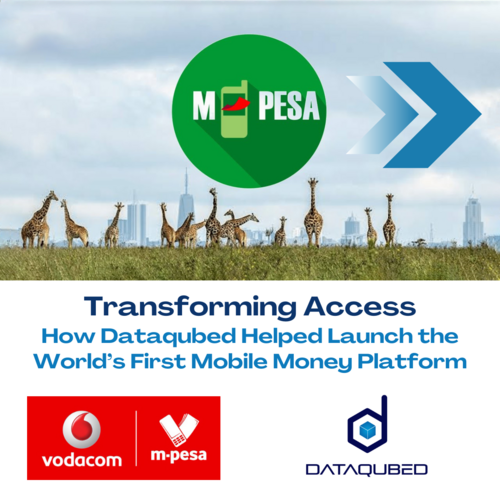Case Studies
Case Study
Who We Helped
Vodafone Group, in partnership with Safaricom and supported by UK consultancy and data engineering experts including Dataqubed, aimed to launch a mobile money transfer platform to bring financial access to millions of unbanked individuals in Kenya.
The Challenge We Tackled
In the early 2000s, a significant majority of Kenya’s population lacked access to formal banking services. Traditional infrastructure couldn’t serve rural communities effectively, and informal financial systems lacked security and scale. The challenge was to build a robust, real-time mobile platform that could operate securely, handle millions of micro-transactions daily, and support person-to-person and business transactions - without relying on conventional banks or internet connectivity.
How We Got Involved
Dataqubed team members were part of the core delivery group, embedded within the consulting partnership that worked with Vodafone and Safaricom. Drawing on deep expertise in database architecture, real-time systems, and scalable infrastructure, our consultants contributed directly to the design and build of the technical backbone that powered M-PESA’s initial rollout and early success.
What We Delivered
- Designed and implemented high-performance SQL Server-based architecture to support secure, high-volume transaction processing.
- Delivered a scalable, modular infrastructure that enabled real-time data exchange across telecom and banking networks.
- Supported the setup of core data systems capable of handling GDP-scale financial transactions across multiple African markets.
- Created a resilient technical framework that would scale from pilot to national and eventually multi-country deployment.
What Changed
- M-PESA rapidly became a cornerstone of financial inclusion in Kenya, with over 2 million users in its first year.
- The system scaled to support tens of millions of users across multiple African countries, facilitating everything from peer-to-peer payments to bill pay and microloans.
- It spurred global interest in mobile-first financial ecosystems, influencing policy, regulation, and technology strategies far beyond East Africa.
- The technical infrastructure - designed and supported by the same experts who now form Dataqubed - remains a benchmark for reliability, scalability, and inclusive digital transformation.
- M-PESA contributed to measurable improvements in household income and resilience, with studies linking its adoption to poverty reduction and increased financial stability.
The platform’s success has been widely researched and taught in business schools, development economics courses, and innovation studies worldwide. It remains a benchmark for digital financial inclusion and is frequently cited in global case studies and academic research.
🔗 M-PESA Wikipedia page
🔗 MIT Sloan Research: The Role of Digital Innovation in Scaling M-PESA
🔗 GSMA Case Study: M-PESA's Impact in Kenya
Key Takeaways
Mobile-first design can unlock entirely new financial ecosystems
"M-PESA is a classic example of leapfrog innovation — using mobile phones to bring banking services to millions who never had access before."
- Bill Gates
When technology meets real-world need, the social impact is exponential
"It’s transformed lives. M-PESA is the most successful mobile money system in the developing world, helping millions of people move out of poverty."
- Michael Joseph, Former CEO, Safaricom
User trust isn’t a feature - it’s the foundation of scale
"The success of M-PESA shows that fintech doesn’t have to be complicated. Simplicity, security, and user trust are what made it scale."
- World Bank Development Report (2016)
Innovation doesn’t need to follow the West - it can lead from anywhere
"M-PESA has provided financial services to people who were previously invisible to the banking system. It’s one of the most important innovations to come out of the global South."
- Professor Tavneet Suri, MIT Sloan



